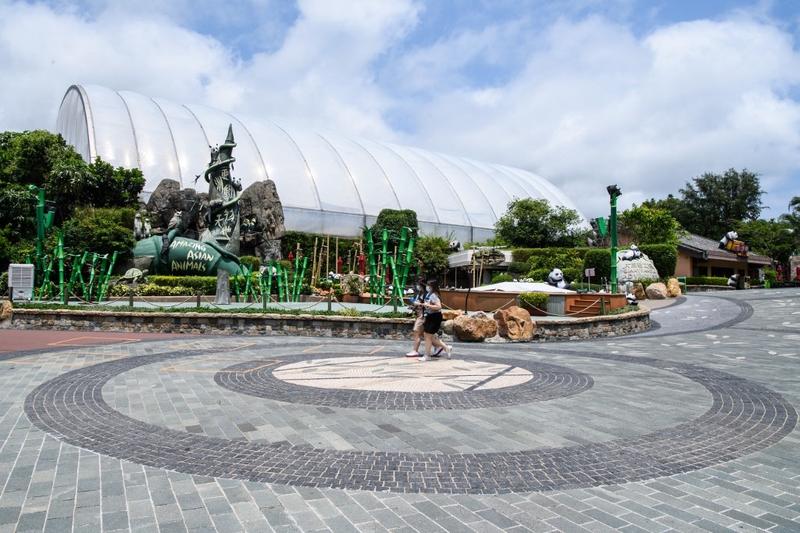 Two women wear face masks, as a preventive measure against the COVID-19 novel coronavirus, as they walk past the "Amazing Asian Animals" section of the currently closed local theme park Ocean Park in Hong Kong on May 19, 2020.
(ANTHONY WALLACE / AFP)
Two women wear face masks, as a preventive measure against the COVID-19 novel coronavirus, as they walk past the "Amazing Asian Animals" section of the currently closed local theme park Ocean Park in Hong Kong on May 19, 2020.
(ANTHONY WALLACE / AFP)
HONG KONG - Hundreds of parked tour buses are gathering dust at a northern Hong Kong container port, having been off the road for 10 months since authorities banned non-resident arrivals into the city due to the new coronavirus.
The area has turned into a “bus cemetery,” said Freddy Yip, president of Hong Kong’s Travel Agent Owners Association. He said the financial hub – which was the world’s leading tourist city destination last year - faces a similar fate at the end of November, when the government ends a wide-ranging wage subsidy program that has helped about 2 million employees in all types of industries.
READ MORE: HK total visitor arrivals in 2019 down 14.2% amid unrest
The program was introduced in June and renewed in September, but the Hong Kong government has ruled out an extension beyond the end of November citing the high cost, leaving many tourism-dependent businesses on the brink of collapse, unable to find other revenue sources and unable to pay wages.
About 56 million people visited Hong Kong last year. The city was ranked number one for arrivals globally in 2019 by research company Euromonitor International
“If they cannot see any light ahead of them, they will just stop and cut their losses,” said 70-year-old Yip, who has worked in the trade for nearly 50 years.
A spokesperson for the Hong Kong government said it would “keep a close watch on the latest situation and respond in a timely manner,” but gave no further details.
About 56 million people visited Hong Kong last year. The city was ranked number one for arrivals globally in 2019 by research company Euromonitor International. Visitors, most of them from the Chinese mainland, are drawn to its vibrant mix of cultures, dramatic harbor views and world-class shopping.
The special administrative region makes about 5 percent of its gross domestic product, or about US$18 billion, directly from tourism, not counting money spent in local shops and restaurants. Hong Kong’s tourism sector directly employs about 260,000 people, according to the government.
Mainland visitors typically spend more per day than the average resident on baby formula, cosmetics and luxury goods, driven by a perception that Hong Kong has better quality standards than at home. That source of spending was cut off in early February, when Hong Kong sealed its borders to the mainland, with exemptions only for a small number of business travelers.
Bubble trouble
Visitor arrivals have been down 96 to 99 percent year-on-year every month since February, according to government figures. A travel bubble with Singapore – allowing a limited number of people to move between the cities after being tested for the virus – is due to begin this week, but is not likely to halt that decline, industry executives said.
The arrangement lets travelers forgo quarantine, but is initially limited to one daily flight of only 200 passengers each way. That is a drop in the ocean for Hong Kong, which set its own record in January 2019 with 6.8 million visitors, including 5.5 million from the Chinese mainland.
The city makes about 5 percent of its gross domestic product, or about US$18 billion, directly from tourism, not counting money spent in local shops and restaurants. Hong Kong’s tourism sector directly employs about 260,000 people, according to the government
Tour guide Mimi Cheung, 46, said she was pessimistic about the travel bubble, due to the limited number of people, strict regulations and high costs – around HK$2,000 (US$260) for mandatory virus tests, plus around HK$6,000 (US$774) to buy a tour in either city.
“The government should open the mainland border under safe conditions. It will bring some hope,” said Cheung, who has found temporary work as a night security guard to provide for her parents and two children.
Hong Kong leader Carrie Lam Cheng Yuet-ngor has said reopening the border with the mainland remains a priority.
The city’s government has been trying to spur local tourism by offering free tours for small groups, but operators say it has been little help.
ALSO READ: Tourism sector to get HK$400-m subsidy as visitors decline
Dozens of travel agencies have told staff to take unpaid leave from December, saying they can no longer afford to pay salaries or rent, according to employees interviewed by Reuters, travel associations and local media reports.
Violent anti-government street protests stemming from the extradition bill incident discouraged some tourists in the second half of last year, leaving many operators without cash buffers to weather this year’s crisis.
The city’s meetings and conventions business is also likely to see a 90 percent revenue drop this year, equivalent to about HK$50 billion (US$6.45 billion), said Stuart Bailey, chairman of the Hong Kong Exhibition & Convention Industry Association.
The sector, which employs around 80,000 people, has had to cancel most of this year’s events, he said.
“People are not optimistic we will be back to 2019 levels for at least 18 months to two years.”



